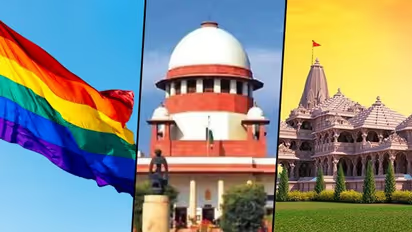India@75: 5 landmark judgements that impacted a billion Indians
Our legal system is one of the main reasons why these 75 years have been successful for Indian democracy. As India completes 75 years of its independence, let's take a look at some of the country's landmark judgments made by the Supreme Court.

Judiciary is one of the pillars of Indian democracy. Time and again, the citizens of this country have looked up to the legal framework to secure justice. There have been innumerable judgements passed by various courts in India that have not only upheld the country's Constitution, but also reinforced people faith in the judiciary. Today, as we complete 75 years of our independence and celebrate Azadi Ka Amrit Mahotsav, let us take a look at some of the landmark verdicts.
Section 377 repealed (2018)
The SC ruled that Section 377 was unconstitutional “in so far as it criminalises consensual sexual conduct between adults of the same sex.” The Supreme Court affirmed that Article 14 of the Constitution ensures equality before the law and that this protection extends to all classes of people, reestablishing the LGBTQ Community's sense of inclusion.
By pointing out that equality before the law cannot be denied by giving primacy to public or religious morality, the SC reaffirmed the supremacy of constitutional morality in India. According to SC, homosexuality is not a human-only condition, dispelling the myth that it is incompatible with the natural order of things.
Also Read | India@75: Meet Verghese Kurien, the father of White Revolution
Ayodhya verdict (2019)
This was one of the most eagerly awaited judgements in India's judicial history. Putting an end to a century-old dispute, the Supreme Court, in a majority decision, allowed for the construction of a Ram temple at the contentious site in Ayodhya and ordered the government to provide the Sunni Waqf Board a 5-acre plot on which to erect a mosque.
Also Read | India@75: 'Inquilab Zindabad' to 'Karo ya Maro'; 5 inspirational slogans to remember
Triple Talaq Judgement (2016)
The SC prohibited the antiquated practise of quick "triple talaq," which allowed Muslim men to break their marriages unilaterally by saying "talaq" three times without providing for support or alimony. The Supreme Court ruled that the Muslim community's long-standing custom of quick triple talaq was unconstitutional. Three different judgements by the five-judge Constitution bench, which is chaired over by Chief Justice J. S. Khehar, resulted in a 3:2 split decision.
The order aims to challenge the prevailing wisdom that changes to personal or religious laws should be made by the community, not by Parliament or the courts.
The majority of judges decided that it was against the Constitutional requirements to grant a Muslim man a divorce by using the talaq (talaq-e-biddat) three times. They looked back to past statutes and high court rulings to invalidate triple talaq as being against Islam's sacred book, the Quran, in two distinct judgements.
Nirbhaya case (2014)
The 2012 Delhi gang murder and rape event involves a rape and a violent attack that took place on December 16, 2012. A 23-year-old woman was brutally attacked, gang-raped, and abused in a private transport that she and her male companion had boarded.
Six men, including the driver, were on the bus when the woman was raped and her friend was also physically assaulted. After 11 days since the incident, she was subsequently taken to a hospital in Singapore for emergency medical care.
After reviewing all of the evidence in the Nirbhaya case, the Supreme Court sentenced four adults to death and placed the youngster in a rehabilitation institution for three years.
The Rape law was amended and the definition of rape was amended and widened. The definition will reprimand penetration of any woman’s orifice with any part of man’s body or with any material or object. The punishment of rape included a compulsory minimum sentence of 20 years and death in extreme cases
The offenders received death sentences in accordance with Section 302 of the Indian Penal Code. The inmates were to be strung up by their necks until they died.
Also Read | India@75: Homi Bhabha to APJ Abdul Kalam, 5 scientists who made India proud
Shah Bano Begum case (1985)
Shah Bano, a 62-year-old Muslim woman from Indore, Madhya Pradesh, divorced her famous lawyer husband Mohammed Ahmad Khan, and in April 1978, Shah Bano petitioned the court for support from him. Later in November, Khan had issued an irreversible talaq to her. She appeared in court and asserted her right to maintenance under Section 123 of the Code of Criminal Procedure, 1973, on behalf of herself and her five children. A man is legally required by this provision to support his wife both during and after the marriage, if she is unable to support herself.
Iddat is the time a woman must wait before getting remarried after her spouse passes away or they get divorced. The iddat period's duration is inferred from other factors. The ruling was made by the Supreme Court of India in 1985 following thorough deliberation. Regarding the possibility of using the CrPC, 1973, which is applicable to all Indian citizens regardless of their faith, in this situation.
The High Court's judgement to compel Shah Bano to get maintenance under the CrPC was then affirmed by Chief Justice of India Y.V. Chandrachud. The supreme court increased the amount of maintenance, on its part.
Also Read | India@75: Story of Komaram Bheem, the tribal who gave the 'Jal, Jungle, Zameen' slogan